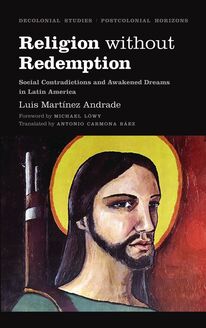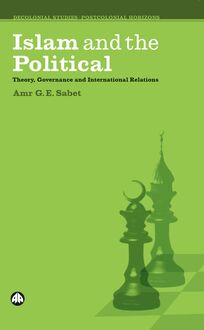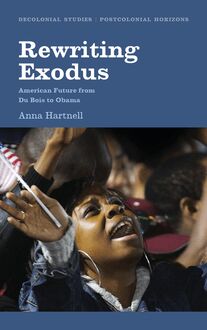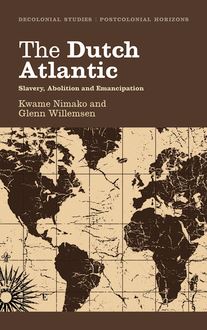Religion Without Redemption , livre ebook
122
pages
English
Ebooks
2015
Vous pourrez modifier la taille du texte de cet ouvrage
Obtenez un accès à la bibliothèque pour le consulter en ligne En savoir plus
Découvre YouScribe et accède à tout notre catalogue !
Découvre YouScribe et accède à tout notre catalogue !
122
pages
English
Ebooks
2015
Vous pourrez modifier la taille du texte de cet ouvrage
Obtenez un accès à la bibliothèque pour le consulter en ligne En savoir plus
Publié par
Date de parution
20 mars 2015
Nombre de lectures
5
EAN13
9781783712946
Langue
English
It focuses on how the centrality of religion for the people of Latin America has influenced how they interact with the changes in the modern economic system. Capitalism has taken on religious characteristics: it has sacred places of worship, such as the shopping mall, as well as its own prophets. This book explains how this form of ‘cultural religion’ accompanies many aspects of life in a contradictory manner: not only does it fulfil the role of legitimating oppression, it also can be a powerful source of rebellion, unveiling thus a subversive side to the status quo.
Religion Without Redemption advances the ideas of liberation theory into the 21st century, and challenges the provincialism to which many Latin American thinkers are usually consigned.
Foreword by Michael Löwy
Prologue
Part I: Entelechies and Cathedrals
1. Civilising Paradigms and Colonial Atavisms: Power and Social Sciences
2. The Shopping Mall as the Paradigmatic Figure of Neocolonial Discourse: Racism and Power in Latin America
Part II: Utopia and Liberation
3. The Portentous Eclosion of the Principle of Hope: Ernst Bloch and Liberation
4. The Gun Powder of the Dwarf: Unearthly Reflections on Contemporary Political Philosophy
5. Tendencies and Latencies of Liberation Theology in the Twenty-First Century
Notes
Bibliography
Index
Religion without Redemption
Decolonial Studies, Postcolonial Horizons
Series editors:
Ramón Grosfoguel (University of California at Berkeley)
Barnor Hesse (Northwestern University)
S. Sayyid (University of Leeds)
Since the end of the Cold War, unresolved conjunctures and crises of race, ethnicity, religion, diversity, diaspora, globalisation, the West and the non-West, have radically projected the meaning of the political and the cultural beyond the traditional verities of left and right. Throughout this period, Western developments in ‘international relations’ have become increasingly defined as corollaries to national ‘race relations’ across both the European Union and the United States, where the re-formation of Western imperial discourses and practices has been given particular impetus by the ‘war against terror’. At the same time, hegemonic Western continuities of racial profiling and colonial innovations have attested to the incomplete and interrupted institution of the postcolonial era. Today we are witnessing renewed critiques of these postcolonial horizons at the threshold of attempts to inaugurate the political and cultural forms that decolonisation now needs to take within and between the West and the ‘non-West’. This series explores and discusses radical ideas that open up and advance understandings of these politically multicultural issues and theoretically interdisciplinary questions.
Also available:
Rewriting Exodus American Futures from Du Bois to Obama Anna Hartnell
The Dutch Atlantic Slavery, Abolition and Emancipation Kwame Nimako and Glenn Willemsen
Islam and the Political Theory, Governance and International Relations Amr G.E. Sabet
The Politics of Islamophobia Race, Power and Fantasy David Tyrer
Religion without Redemption
Social Contradictions and Awakened Dreams in Latin America
Luis Martínez Andrade
Translated by Antonio Carmona Báez Foreword by Michael Löwy
First published in Spanish as Religión sin redención. Contradicciones sociales y sueños despiertos en América Latina , © Taberna Libraria Editores, second edition, 2012.
First English-language edition published 2015 by Pluto Press 345 Archway Road, London N6 5AA
www.plutobooks.com
La presente publicación fue realizada con el estímulo del Programa de Apoyo a la Traducción (PROTRAD), dependiente de las instituciones culturales de México convocantes .
This publication was made possible with the help of the Translation Support Programme (PROTRAD), which has been established by a number of Mexican cultural institutions.
Copyright © Luis Martínez Andrade 2015
The right of Luis Martínez Andrade to be identified as the author of this work has been asserted by him in accordance with the Copyright, Designs and Patents Act 1988.
British Library Cataloguing in Publication Data
A catalogue record for this book is available from the British Library
ISBN 978 0 7453 3574 2 Hardback
ISBN 978 0 7453 3572 8 Paperback
ISBN 978 1 7837 1293 9 PDF eBook
ISBN 978 1 7837 1295 3 Kindle eBook
ISBN 978 1 7837 1294 6 EPUB eBook
This book is printed on paper suitable for recycling and made from fully managed and sustained forest sources. Logging, pulping and manufacturing processes are expected to conform to the environmental standards of the country of origin.
10 9 8 7 6 5 4 3 2 1
Typeset by Stanford DTP Services, Northampton, England
Text design by Melanie Patrick
Simultaneously printed by CPI Antony Rowe, Chippenham, UK and Edwards Bros in the United States of America
In memory of Frantz Fanon
Marx lays bare the causal connection between economy and culture. For us, what matters is the thread of expression. It is not the economic origins of culture that will be presented, but the expression of the economy in its culture.
Walter Benjamin
Contents Foreword by Michael Löwy Prologue Part One: Entelechies and Cathedrals 1. Civilising Paradigms and Colonial Atavisms: Power and Social Sciences 2. The Shopping Mall as the Paradigmatic Figure of Neocolonial Discourse: Racism and Power in Latin America Part Two: Utopia and Liberation 3. The Portentous Eclosion of the Principle of Hope: Ernst Bloch and Liberation 4. The Gun Powder of the Dwarf: Unearthly Reflections on Contemporary Political Philosophy 5. Tendencies and Latencies of Liberation Theology in the Twenty-First Century Notes Bibliography Index
Foreword
Luis Martínez Andrade is a brilliant young Mexican scholar, whose writings, published in Spanish, Portuguese, Polish, English and French, are beginning to attract world-wide attention. His essay on shopping malls, included in this book, received first prize for the 2009 international competition Thinking Against the Current, organised by the Cuban Book Institute. This volume is a collection of essays, on very different topics; however, in spite of the diversity, it holds remarkable unity and coherence, given by his theoretical/political approach: a critical Marxist viewpoint, from an emancipatory – that is, anti-capitalist – Latin American perspective. The multiplicity of his intellectual sources in radical theory, both European and Latin American, is impressive: Walter Benjamin and the Frankfurt School, Antonio Gramsci and Ernst Bloch, world-system analysis (Immanuel Wallerstein), philosophy of liberation (Enrique Dussel), decoloniality (Anibal Quijano), liberation theology (Leonardo Boff), and other renowned writers such as Walter Mignolo, Gianni Vattimo, Slavoj Žižek.
Martínez Andrade uses this rich body of cultural tools in order to develop his own thinking. This applies also to the numerous references to my writings: they only appear if useful to the assertion of his own arguments. His writings are not idle academic exercises, but inspired, as he tells us in his prologue, by rage – the ‘noble rage’ ( digna rabia ) proudly asserted by the Mexican Zapatistas – and hope : rage against the injustice of the system, and hope in a radical alternative.
One of the most original aspects of the book is the combination of the classical Marxist analysis of imperialism with the arguments of decolonial thinking. Thanks to his roots in Mexican indigenous culture and collective memory, Martínez Andrade clearly understands the real meaning of the so-called ‘Discovery of the Americas’: a violent and brutal enterprise of colonial conquest, which until today shapes the behaviour of the ruling oligarchy in the continent. The system of domination in Latin America is still based on the coloniality of power (Anibal Quijano), that is, the racist segregation and ruthless exploitation, both by the imperialist/colonial powers and the local ruling classes, of the Indigenous, Black and mestizo masses that constitute the majority of the population. Moreover, the processes of knowledge and the social sciences are deeply shaped by epistemological paradigms which produce and reproduce dependency and colonial domination.
Max Weber, in his celebrated lecture on ‘Science as vocation’ (2004 [1919]) spoke of the conflict between irreducibly antagonistic systems of values as a ‘War of Gods’ ( Kampf der Götter ). A similar sort of conflict is the red thread running through the essays of Martínez Andrade’s book: the war between the God of Commodity, the new Golden Calf, and the God of the Poor, celebrated by liberation theology.
As Ernst Bloch and Walter Benjamin, as well as the Latin American theologists, had grasped, capitalism functions as a sort of religion. Its idols – the Market, Money, Capital, the Foreign Debt and Competition – are ruthless, and require human sacrifices: the lives of the poor. Shopping malls are temples for the Commodity-cult and the fanatical adoration of the Holy Brands.
The opposite side in this War of Gods is religion as Spirit of Utopia , or as the Principle of Hope (Ernst Bloch), which has its roots in the biblical prophets and the first Christian communities, and took a new subversive form during the sixteenth-century Peasant War (Friedrich Engels) under the leadership of the revolutionary theologian Thomas Müntzer. Latin American liberation theology – represented by Leonardo Boff, Frei Betto, Rubén Dri, Jung Mo Sung, Hugo Assmann and many others – is the inheritor of this radical tradition; its intransigent opposition to the capitalist religion, particularly in its deadliest form, neoliberalism, and its unconditional commitment to the self-emancipation of the poor contributed powerfully to the upsurge of social movements and revolutionary struggles, and changed the history of Latin America.
Through its unique synthesis of theology and revolution, heterodox Marxism and leftist postcolonialism, anti-capitalist social science and anti-colonial epistemology, philosophy and (critique of) political economy, ecology and socialism, Martínez Andrade’s collection of essays is a fascinating contribution to the renewal of Critical Theory at the beginning of the twenty-first century. His radical Latin American perspective is certainly one of the reasons for the originality and forcefulness of his insights.
Michael Löwy Paris, 5 August 2014
Prologue
The essays that the reader now holds in her/his hands have been written at different latitudes but all hold the same origin. On the one hand, they were born out of rage and, on the other, out of hope. Rage due to the dire situation with which most of humanity is confronted and the terrible level of exploitation that brings both human life and the entire planet to the edge of destruction. This should not be interpreted as some naïve irritation, commonly found among those ‘warm souls’ who, when watching children die of hunger, cry for the suffering of the most vulnerable. No. Our abhorrence stems from something else. It is a hate with class. It is a noble rage.
It is through the emancipatory social movements – as another expression of class – that we find the possibility of rupture with hi







